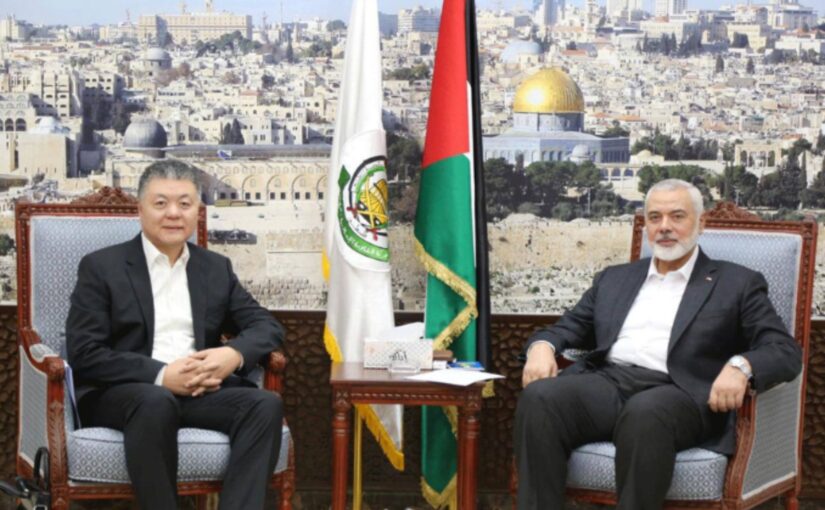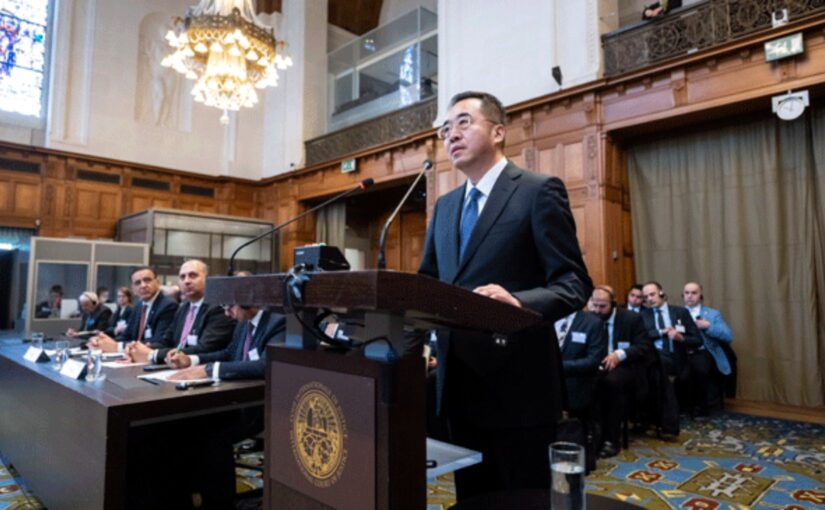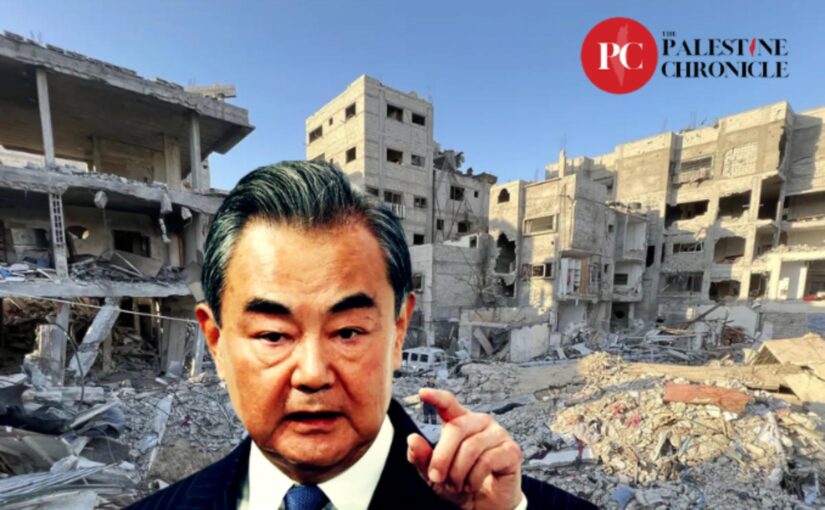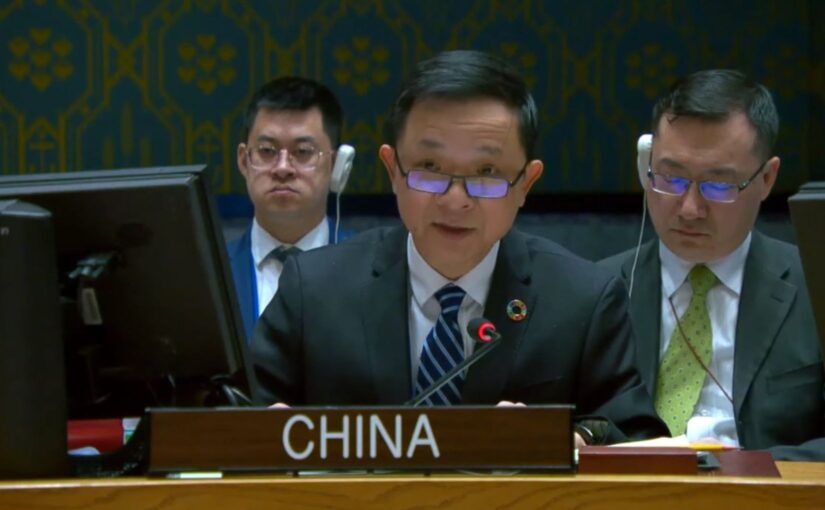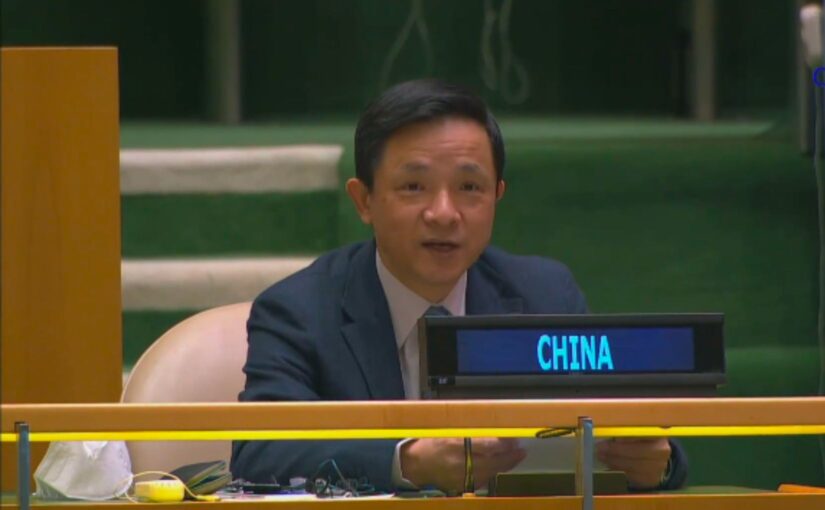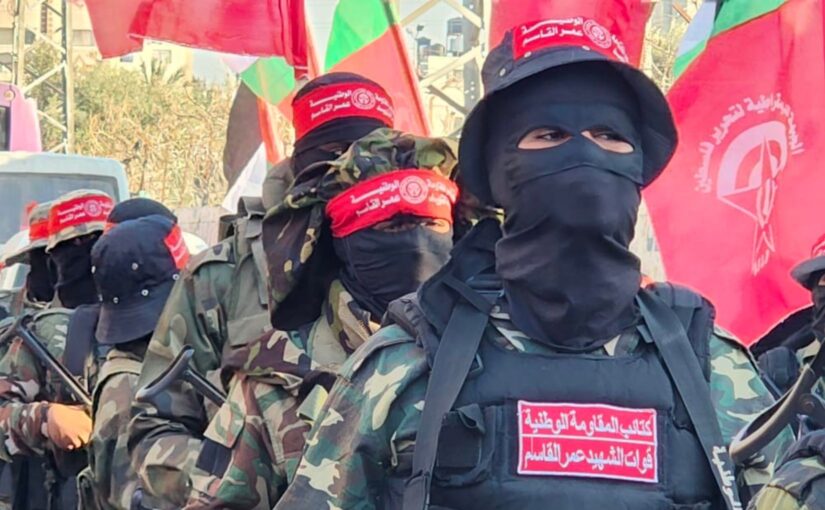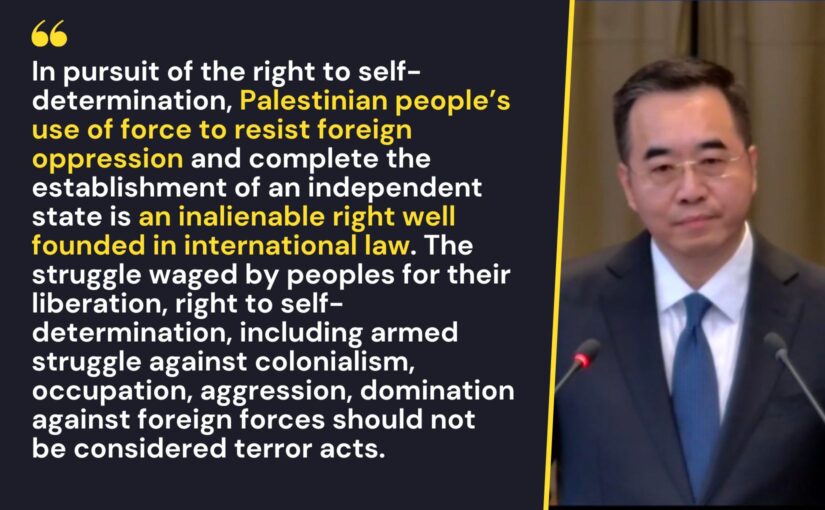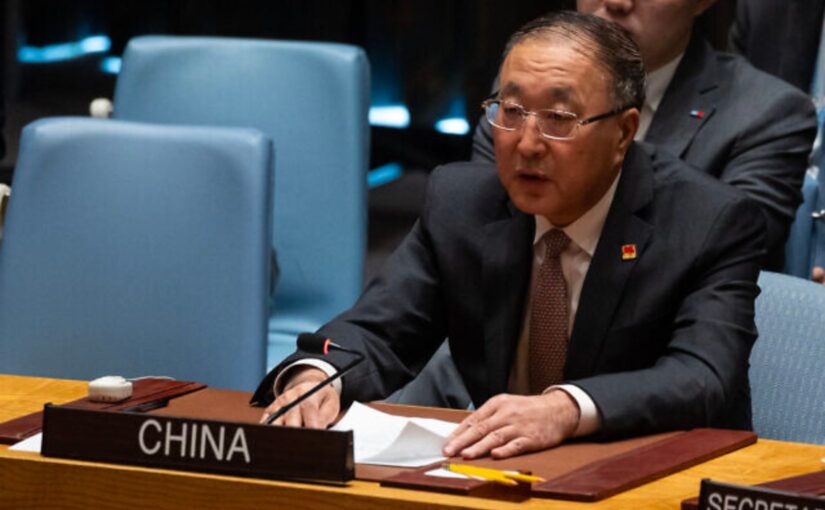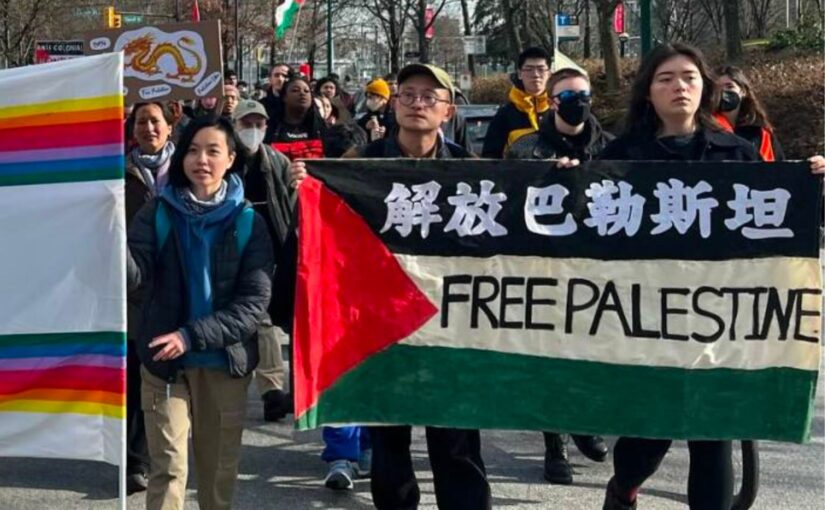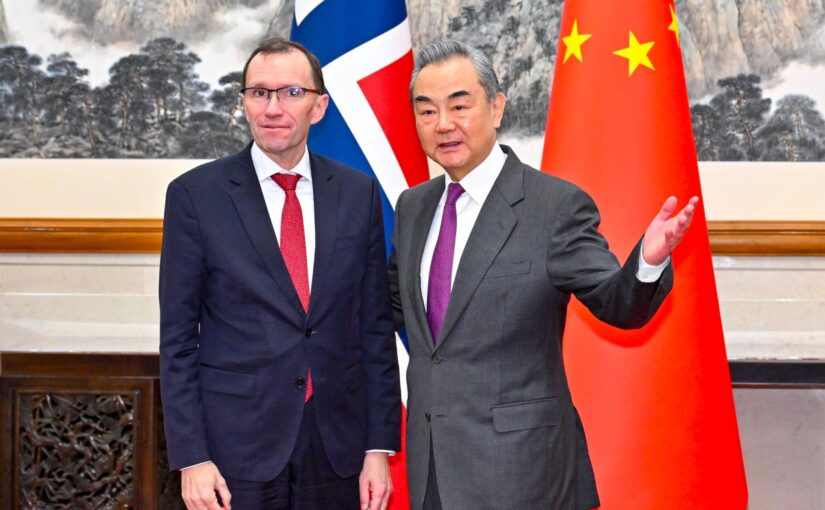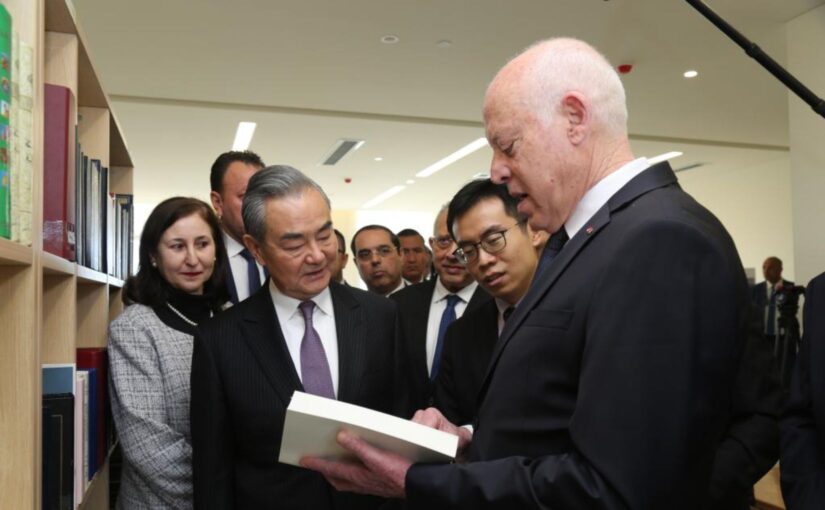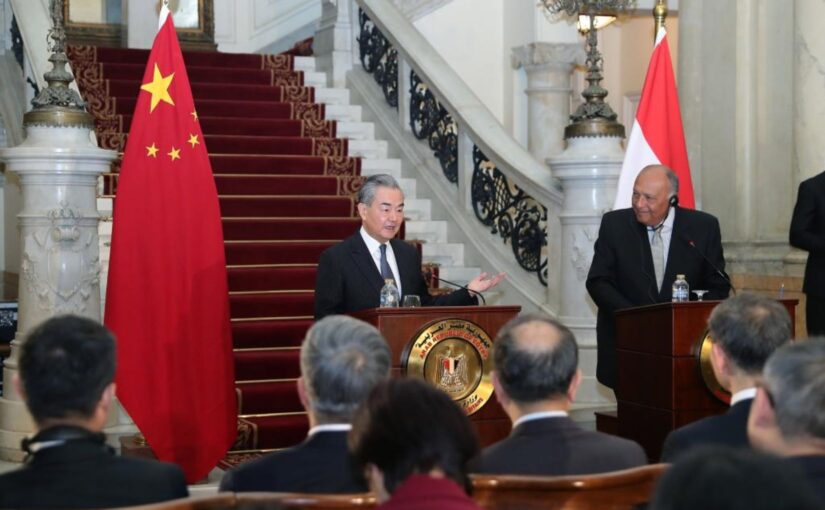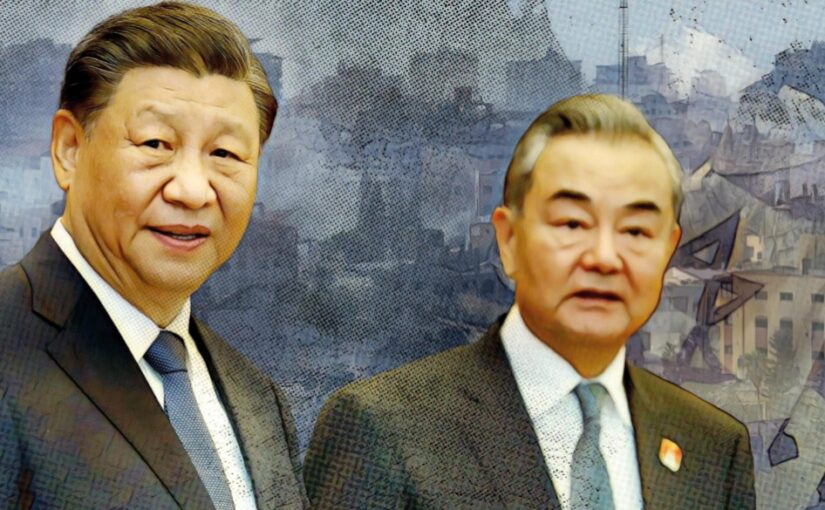Chinese Foreign Minister Wang Yi visited Tunisia as the second leg of his January Africa tour following his visit to Egypt.
Meeting with Tunisian President Kais Saied on January 13, both men expressed opposition to interference in other countries’ internal affairs under the pretext of human rights and democracy.
During their talks, President Saied voiced great appreciation for Chinese President Xi Jinping’s philosophy of governance, commending China’s great achievements in promoting modernisation, as well as the 60 years of development of Tunisia-China relations and the fruitful results of their pragmatic cooperation.
“Although Tunisia and China are far apart, our friendship is strong and our people are close to each other,” he said, expressing thanks for China’s long-term and valuable support in helping Tunisia to develop and improve people’s lives.
He added that Tunisia will continue to actively participate in the Belt and Road Initiative, learn from China’s successful experience, and promote modernisation with Tunisian characteristics.
For his part, Wang said that since the establishment of diplomatic relations between China and Tunisia 60 years ago, bilateral ties have stood the test of an evolving international landscape and have maintained healthy and stable development. The most important experience is that the two countries have trusted each other and carried out mutually beneficial cooperation based on mutual trust and equal treatment.
The world today is afflicted with uncertainty and instability as well as rampant unilateralism, power politics and hegemony, he added, noting that China opposes the imposition of one’s own values, opposes the transformation of other countries according to one’s own standards, and opposes the interference in other countries’ internal affairs under the pretext of human rights and democracy.
Saied said that the history of colonialism cannot be repeated, and the world cannot return to unipolar hegemony. Tunisia opposes double standards and interference in other countries’ internal affairs.
China’s top diplomat also met with Nabil Ammar, Tunisian minister of foreign affairs, migration and Tunisians abroad.
During their meeting, Wang emphasised that Xi Jinping Thought on Socialism with Chinese Characteristics for a New Era provides the fundamental guidance for building China into a great country and for the great cause of national rejuvenation. through Chinese modernisation. China’s development in the new era has also provided a useful reference for other countries intending to speed up development while preserving their independence, he added.
For his part, Ammar said that the two sides will strengthen solidarity and coordination to jointly safeguard the legitimate interests of developing countries and uphold the principle of non-interference in internal affairs and international equity and justice.
The two ministers also exchanged views on the Palestinian-Israeli conflict and agreed to continue to jointly support the just cause of the Palestinian people to restore their legitimate national rights.
President Saied and Minister Ammar also joined Wang Yi for the inauguration of the International Diplomatic Academy in the capital Tunis, the first of its kind that China has built in an Arab country.
At the ceremony, Wang also called for building an equal and orderly multipolar world and advancing an inclusive economic globalisation that benefits all. He underlined that all countries, big or small, strong or weak, rich or poor, should play their due role and enjoy the right to development and revitalisation.
The following articles were originally published by the Xinhua News Agency.
Tunisia, China oppose interference in internal affairs under pretext of human rights
TUNIS, Jan. 16 (Xinhua) — Tunisian President Kais Saied and visiting Chinese Foreign Minister Wang Yi on Monday expressed opposition to interference in other countries’ internal affairs under the pretext of human rights and democracy.
During their talks, Saied voiced great appreciation for Chinese President Xi Jinping’s philosophy of governance, commending China’s great achievements in promoting modernization, the 60 years of development of Tunisia-China relations and the fruitful results of pragmatic cooperation.
“Although Tunisia and China are far apart, our friendship is strong and our people are close to each other,” Saied said, expressing thanks for China’s long-term and valuable support in helping Tunisia to develop and improve people’s lives.
He said that Tunisia will continue to actively participate in the Belt and Road Initiative, learn from China’s successful experience, and promote modernization with Tunisian characteristics.
Tunisia will uphold the one-China principle, abide by UN General Assembly Resolution 2758, and support China in exercising sovereignty over all its territory, he said.
For his part, Wang, also a member of the Political Bureau of the Communist Party of China Central Committee, said that since the establishment of diplomatic relations between China and Tunisia 60 years ago, bilateral ties have stood the test of an evolving international landscape, and have maintained healthy and stable development. The most important experience is that the two countries have trusted each other and carried out mutually beneficial cooperation based on mutual trust and equal treatment.
The heads of state of the two countries have lately exchanged congratulatory messages, charting the course of the development of bilateral ties, said Wang, thanking Tunisia for its support on issues involving China’s core interests and major concerns.
China also firmly supports Tunisia in safeguarding sovereignty, independence and national dignity, exploring a development path in line with its own national conditions, and independently advancing the national reform process.
“We stand ready to consolidate political mutual trust between the two sides, deepen cooperation in various fields, accelerate respective development and revitalization,” he said.
The world today is afflicted with uncertainty and instability as well as rampant unilateralism, power politics and hegemony, said Wang, noting that China opposes the imposition of one’s own values, opposes the transformation of other countries according to one’s own standards, and opposes the interference in other countries’ internal affairs under the pretext of human rights and democracy.
China is willing to strengthen unity and coordination with Tunisia to jointly implement the Global Development Initiative, Global Security Initiative and Global Civilization Initiative, to promote economic globalization featuring equal, orderly global multipolarity and inclusiveness.
Saied said that the history of colonialism cannot be repeated and the world cannot return to unipolar hegemony. Tunisia opposes double standards and interference in other countries’ internal affairs under the banner of democracy and human rights.
“The series of important global initiatives proposed by President Xi demonstrate China’s cultural heritage and global vision,” Saied said, expressing willingness to work with China and other developing countries to safeguard common values of mankind, defend international fairness and justice, and build a community with a shared future.
The two sides also exchanged views on the Palestinian-Israeli conflict and other issues.
Also on Monday, Wang held talks with Tunisian Foreign Minister Nabil Ammar.
Chinese, Tunisian FMs stress independent development
TUNIS, Jan. 16 (Xinhua) — Visiting Chinese Foreign Minister Wang Yi and Nabil Ammar, Tunisian minister of foreign affairs, migration and Tunisians abroad on Monday voiced willingness to support each other’s independent development.
Wang, also a member of the Political Bureau of the Communist Party of China Central Committee, said that this year marks the 60th anniversary of the establishment of diplomatic ties between China and Tunisia, thereby having great significance in bridging the past and the future.
“We are ready to take this opportunity to work with Tunisia to review the successful experience and grow our traditional friendship so as to write a new chapter in China-Tunisia friendly cooperation,” he said.
The two sides need to support each other on issues involving each other’s core interests and major concerns, so as to provide a solid foundation for and add strong impetus into bilateral relations, he added.
Xi Jinping Thought on Socialism with Chinese Characteristics for a New Era, Wang said, provides the fundamental guidance for building China into a great country and for the great cause of national rejuvenation through Chinese modernization.
China’s development in the new era has also provided a useful reference for other countries intending to speed up development while preserving their independence, said Wang.
China will promote the modernization of the world with Chinese modernization, and is willing to share experience in governance with Tunisia and enhance Tunisia’s capacity for independent development so as to achieve common development and prosperity, said Wang.
For his part, Ammar said that Tunisia and China, sharing extensive common interests and values, have a solid political foundation, sound development momentum, and inspiring cooperation results in bilateral relations.
The Tunisian side cherishes its friendship with China and will always remember China’s support and help.
Ammar reiterated that Tunisia always firmly upholds the One-China principle and stands ready to work with China to push for greater development of bilateral relations.
As China-Tunisia relations have broad prospects, the two sides agreed to strengthen high-level exchanges, add strategic substance to bilateral relations, and expand all-round cooperation.
The two sides will strengthen solidarity and coordination to jointly safeguard the legitimate interests of developing countries, and uphold the principle of non-interference in internal affairs and international equity and justice.
The two sides also exchanged views on the Palestinian-Israeli conflict and agreed to continue to jointly support the just cause of the Palestinian people to restore their legitimate national rights.
Chinese FM lauds great progress in China-Tunisia ties in past 6 decades
TUNIS, Jan. 15 (Xinhua) — Chinese Foreign Minister Wang Yi on Monday spoke highly of the “great friendship” achieved by China and Tunisia during the past six decades since the establishment of their diplomatic ties.
Wang, also a member of the Political Bureau of the Communist Party of China Central Committee, made the remarks at a ceremony held in the Tunisian capital of Tunis to inaugurate the China-built International Diplomatic Academy of Tunis, which was also attended by Tunisian President Kais Saied and Tunisian Foreign Minister Nabil Ammar.
It took eight years to build the academy, the only one of its kind that China has helped build in an Arab country, the Chinese top diplomat noted.
The academy, which has demonstrated the high level and quality of the China-Tunisia ties, will become a new symbol of and platform for carrying forward the traditional China-Tunisia friendship, he added.
Over the past decades, China and Tunisia have firmly supported each other in safeguarding independence, sovereignty and territorial integrity, and choosing their own paths of development, Wang said.
The two countries have also achieved fruitful results in pragmatic cooperation by successfully implementing a number of high-quality projects to improve people’s livelihoods, maintaining close communication and coordination in international and regional affairs, and working together to safeguard common interests as well as international fairness and justice, he said.
At the ceremony, Wang also called for building an equal and orderly multipolar world and advancing an inclusive economic globalization that benefits all.
He underscored that all countries, big or small, strong or weak, rich or poor, should play their due role and enjoy the right to development and revitalization.
Ammar, for his part, said that this year marks the 60th anniversary of the establishment of diplomatic relations between Tunisia and China, which have achieved smooth progress in bilateral cooperation in various fields.
Strengthening the bilateral friendship is the shared political wish of both sides and conforms to the common interests of the two countries and their peoples, said Ammar.
He expressed gratitude to China for building the academy, which is the concrete result of the joint construction of the Belt and Road and has crystallized the profound friendship between Tunisia and China.
Tunisia will use the academy as a bridge for boosting mutual understanding and exchanges between Tunisia and China, as well as the rest of the world, the Tunisian top diplomat said.
